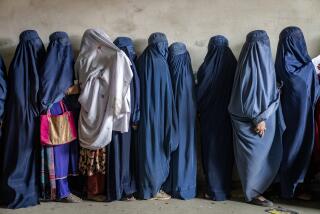Effort to Disarm Kabul Leaves Some at the Mercy of Criminals
- Share via
KABUL, Afghanistan — Kabul has been declared weapons-free, but Mohammed Sabir reflects the capital’s grim reality--he was shot the day the new Afghan government ordered all armed men off the streets.
His home has also been burglarized and his brother kidnapped, all within the last week, reflecting how the crime rate has soared with the departure of the Taliban and the grim kind of law and order they enforced.
Sabir was shot as he was trying to flee gunmen Wednesday, the same day the government ordered all men with weapons off the streets within 72 hours. As the deadline passed at midnight Friday, there were no real signs that Kabul would be anything near safe soon.
Although there was a noticeable reduction in the number of men sauntering down dusty streets with Kalashnikov rifles hanging at their sides and vehicles packed with armed men roaring down the streets, men with guns remained a common sight.
“We see them on the streets, but we stay away from them. They are still here,” said Isatullah Barakzai, a fruit and vegetable vendor.
Nearby, store owner Mohammed Zubai, his dirty brown woolen cap pulled low over his ears, complained about rising crime.
“We have to finish with these armed men. Only men in uniforms should be allowed in the street” with guns, Zubai said.
A policeman for 18 years, Sabir, lay in a grimy hospital bed with a gunshot wound to his side. He blames the soaring crime rate on the armed men who swarmed into Kabul when the repressive Taliban regime fled on Nov. 13 in the wake of relentless U.S.-led bombing. Within hours, heavily armed troops of the U.S.-backed northern alliance took control of the capital.
Since the fall of Kabul to the Northern Alliance, the crime rate has soared. A security official at an international aid organization, who spoke on condition of anonymity, said more than 400 cars have been stolen in the last two months.
There also have been nightly break-ins at homes in every Kabul neighborhood. In just the last two weeks, three high-profile killings have occurred--two doctors and one of the richest businessmen in the capital, robbed of $20,000.
“If you couldn’t take care of the security, then why did you let these thieves into Kabul?” Sabir asked. “George Bush should replace everything I lost.”
International peacekeepers have started making rounds in Kabul to help the fledgling interim regime establish security--this week British soldiers began joint patrols with Afghan policemen. But the troops--to number 4,500 at full deployment--are slow to arrive, with only 1,000 in the capital by Friday
Nighttime is the most dangerous.
Mohammed Aziz, known as “the most famous baker in Kabul” for his traditional Afghan sweets, was held hostage for several nights by armed men who then robbed him and stole his car, said a neighbor, Mohammed Kabir.
But daytime doesn’t stop crime--Mohammed Ibrahim, the richest businessman in Kabul, was shoved into a car by gunmen, robbed and killed a week ago, all in broad daylight.
Kabul security chief Mohammed Qadir said Northern Alliance commanders and the armed men loyal to them have been ordered out of the city. But some still remain, he acknowledged.
Qadir said those who don’t go voluntarily will be forced to leave--or asked to join the army, if they’ve committed no crime.
“We need to teach them what a military is, discipline them,” he said. “We can teach them to be military men, to be officers, to work for the country not against it.”
In a televised speech to the nation last week, interim Prime Minister Hamid Karzai said he wants to see a national army formed to unite his nation and bring the troops of the many warlords under one command.
On the street, any mention of security quickly gathers a crowd, all with stories about gunmen.
All agreed the presence of international forces alongside the police was the only guarantee that Afghans with guns would not fight each other or ordinary residents
More to Read
Sign up for Essential California
The most important California stories and recommendations in your inbox every morning.
You may occasionally receive promotional content from the Los Angeles Times.










